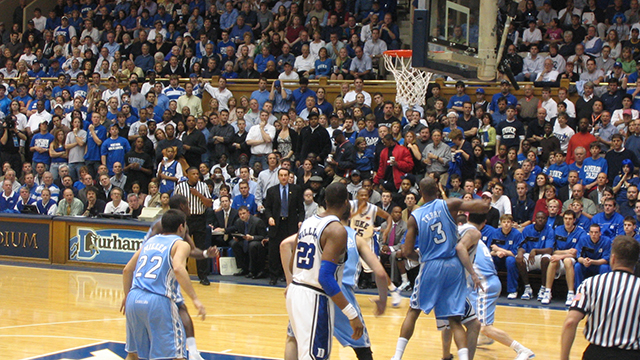Officially considered “amateurs” by the NCAA, college athletes are contractually forbidden from receiving any kind of monetary compensation. That means they can not only receive wages, but are also prohibited from accepting sponsorship deals or any other kind of publicity-related payouts. In fact, there have been multiple high-profile instances of well-known players punished for minor infractions of these rules, as in the case of the University of Georgia’s star running back Todd Gurley, who was suspended from play last year after accepting cash for autographed memorabilia.
The NCAA remains adamant that student athletes not receive any direct financial compensation for their participation. The group insists that the generous scholarships most top student athletes receive, covering their tuition and most living expenses at some of the best schools in the nation, is ample reward, as is the invaluable media exposure. Furthermore, the NCAA argues, the profits from football and basketball are used to fund less lucrative sports like volleyball or golf.
But as profits from college sports continue to surge each year, diminishing the gap between elite college athletics and the pros, a growing number of student advocates argue that college athletes, many of whom practice upwards of 60 hours a week and often accumulate debt even with their scholarships, deserve a share of the profits. It’s their talent, after all, that brings in the billions. Advocates argue that the NCAA is exploiting college athletes by profiting from their skill and celebrity status and not giving them even a small slice of the pie. And, they argue, there is little protection for college athletes who get injured “on the job” and risk losing their scholarships, which are mostly allotted only on a yearly basis..
A recent court decision, though, may shake things up. Last August, a federal judge ruled that the NCAA’s s policy of barring payments to college athletes violated antitrust laws. Former UCLA basketball star Ed O’Bannon is the lead plaintiff in the class action suit. Now a car salesman in Las Vegas, O’Bannon discovered years after graduation that his avatar had been included in a video game without his consent, and he was receiving no royalties at all from the profit the game generated. The judge ruled that athletes in top men’s football and basketball programs can receive a small share of licensing revenues, which they can collect at the end of their college sports careers. The decision, though, is currently being appealed by the NCAA.
Resource
AUDIO: “Money and March Madness” | Sneak Peek (PBS FRONTLINE)
FRONTLINE continues its new monthly magazine program with the lead story “Money and March Madness,” an inside look at the multi-billion dollar business of the NCAA and its brand of amateur college sports. In this investigation, correspondent Lowell Bergman gains access to Sonny Vaccaro, a former marketing executive at Nike, Adidas, and Reebok who helped bring about the rapid commercialization of college basketball. Vaccaro’s success made coaches, administrators, and companies rich. But the players remain at the mercy of the NCAA, which, despite a new $10.8 billion contract for its basketball tournament, has continued to insist that the athletes don’t get paid. Now, Vaccaro has left the business world and he’s spearheading a class-action lawsuit that aims to ensure that players get a piece of the action. See the entire episode on FRONTLINE.
To respond to the Do Now, you can comment below or tweet your response. Be sure to begin your tweet with @KQEDedspace and end it with #DoNowNCAA
For more info on how to use Twitter, click here.
We encourage students to reply to other people’s tweets to foster more of a conversation. Also, if students tweet their personal opinions, ask them to support their ideas with links to interesting/credible articles online (adding a nice research component) or retweet other people’s ideas that they agree/disagree/find amusing. We also value student-produced media linked to their tweets. You can visit our video tutorials that showcase how to use several web-based production tools. Of course, do as you can… and any contribution is most welcomed.
More Resources
ARTICLE: March Madness by the Dollars (The Lowdown)
Although college athletes are considered amateurs and are not allowed to collect any pay to play, college basketball and football is big, big business raking in billions of dollars. March Madness alone generates more than a billion dollars a year in ad revenue. Here we look at March Madness by the dollars and cents.
AUDIO: Does NCAA Ban On Paying Student Athletes Violate Federal Law? (NPR)
The top college basketball teams face off this week in the NCAA tournament. And, a panel of judges will hear arguments over whether colleges should be allowed to pay basketball and football players.
ARTICLE: N.C.A.A. Must Allow Colleges to Pay Athletes, Judge Rules (New York Times)
In a decision that could drastically reshape the world of college sports, a federal judge ruled on Friday that the N.C.A.A.’s decades-old rules barring payments to college athletes were in violation of antitrust laws.
